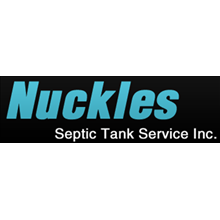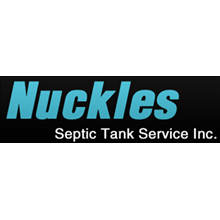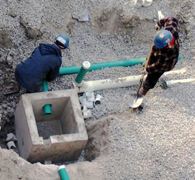If you have a septic system, should you have a garbage disposal? Probably not. The finely ground products will float on the surface of the water and make their way into the lines and clog them. Consider composting food products.
If you're buying a home that's not connected to a municipal sewer system, you're going to want to ask the seller about the location of septic tank.
Septic systems require more attention than some owners think, but they are also the most self- reliant system that you can have with only an occasional bit of upkeep required. A professional septic care company can give you the help you need and all the information to do it right.
If your septic tank fills with silt after a heavy flood, you're going to want to have it cleaned out as soon as possible. Using it in that state is definitely something you shouldn't do as its significantly reduced capacity may cause wastewater to back up and overflow.
There are several indications (or red flags, if you will) that a septic system may have a clog and needs immediate servicing. This includes occasional bad odors coming out of plumbing fixtures and slowly draining or gurgling fixtures.
Planning to sell your home? Have the septic tank cleaned before you begin showing the house. In addition to preventing backup or overflow issues, it's also a good time to check for problems.
Did you know that aside from the septic tank, the drain field also needs cleaning? Much of the waste cleaning process takes place in the drain field which is why septic tank cleaning also means checking the drain field.
There are telling signs that your septic tank needs professional cleaning. Two of the most obvious indicators are: (1) an unusual smell around the septic tank area, and (2) the presence of darker grass around the septic tank.
Be careful using anti-bacterial soaps and detergents in your daily routines. Their chemical makeup destroys the good bacteria in your septic system that helps to breakdown waste materials. Using regular soap and rubbing thoroughly will do the trick and not inhibit the septic system.
A leaking toilet releases water into your septic system, and puts an unnecessary strain on it. To test for a leak, put a few drops of food coloring in the tank before going to bed. If the color appears in the bowl's water the next morning, you have a leak.
Septic tank cleaning professionals have the qualifications required for them to be able to clean your septic tank as soon as possible. They also know all related safety protocols so no damage to health or property happens during the process.
Your septic tank system actually has a long lifespan. Well, that is if it is checked and cleaned regularly. Cleaning can extend the lifespan of a septic tank and allow it to function well for up to 30 years.
Did you know that regular cleaning and maintenance of your septic tank can actually help you save more money in the long run? Regular cleaning reduces the risks of severe septic tank complications that will require expensive repairs.
One of the worst things that could happen in your home is for the septic system to back up. As such, it would be a good idea to have the septic tank cleaned regularly and avoid flushing things that can potentially clog the sewer lines.
It’s recommended that you keep a detailed record concerning your septic system and any and all work that’s been performed on it. This should include all inspections, pumping, repairs, and any other maintenance to the system.
If you have faucets that drip or toilet tanks that leak, you will need your septic system pumped more frequently. These seemingly minor problems add to daily water usage and contribute to more rapid filling of the tank.
Did you know that the most basic septic system has only two main parts: the septic tank and the drainfield. The wastewater flows first into the septic tank where it separates, and then the separated wastewater is pushed out into the drainfield.
If your septic tank is due for cleaning, you should also take the opportunity to have the system inspected thoroughly. Leaks in particular, should be dealt with immediately as they may cause dangerous pathogens to enter the environment.
Does your septic system have a grinder pump, septic pump, or sewage ejector pump? Tiny products, like dental floss and cotton swabs can burn out the motor, damage the impeller, or cause other, equally expensive, damage.
Among the things that should never be flushed into a septic system are: cat litter, diapers (cloth and disposable), dryer sheets, dirt, last night’s stew, cotton swabs, cigarette butts, and a host of other materials. They will either clog the system or interfere with its natural decomposing processes.
A septic tank does a very good job of keeping wastewater from becoming a nuisance, but it cannot function indefinitely. Given the limits of its size and the fact that solids flow into it, it will ultimately overflow and contaminate the area it's in if not cleaned on a regular basis.
Generally, a septic tank needs to be pumped out when the bottom of the floating scum layer is within six inches of the outlet pipe. Another indicator is the sunken sludge layer, which needs attention once it’s within 12 inches of that outlet pipe.
While there may be a generally recommended pumping interval, that is not an absolute; the number of people in the household and the tank size determine how often the system needs to be pumped out.





